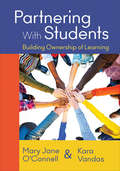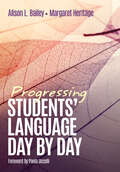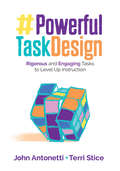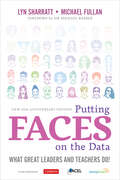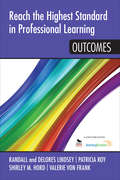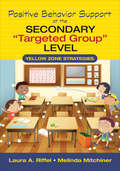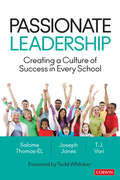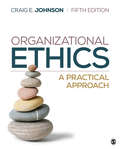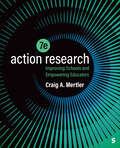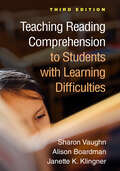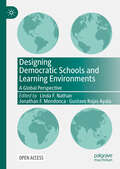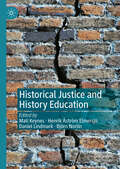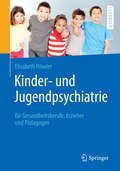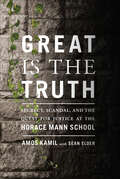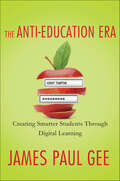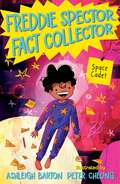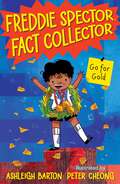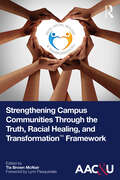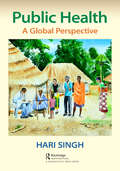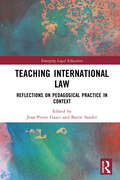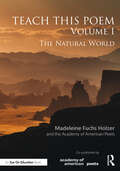- Table View
- List View
Partnering With Students: Building Ownership of Learning
by Mary J. O′Connell Kara L. VandasEmpower students to own their learning The world today needs students prepared to set goals, to fail, to get up and try a new strategy, to fail again, and to persist until their goals are realized. Therefore, we must ask, "Are all students in our classrooms equipped with the skills and confidence to take ownership of their learning? If not, what can we do to change that?" Building on the work of John Hattie, Larry Ainsworth, and other leaders in the field, Partnering With Students: Building Ownership of Learning offers a powerful framework to accelerate student motivation and learning. This resource is designed to empower teachers and leaders with strategies to develop learners who have the confidence and tools to engage in any challenge. By flipping the focus to student ownership of learning, the authors provide clear and simple ways to: Develop collaborative relationships Jointly establish clear expectations for learning and criteria for success Intentionally build learner strategies that last a lifetime Use formative assessment results to monitor progress Harness the power of reciprocal feedback to improve teaching and learning Empower and motivate students set meaningful goals and prove learning When students are invited to partner and share in the responsibility of learning, they become our greatest allies, and we will learn as much from them as they will learn from us. "O’Connell and Vandas provide a wealth of information to educators, proving that it is not only important to be student-focused, but essential if students are to reach their fullest potential. In an era where we seemingly complicate things because we can, it is refreshing to see a book like this that is clearly written, driven by commonsense, evidenced by good practice, and supported with tools and clear examples." — Russell J. Quaglia, President/Founder Quaglia Institute for Student Aspirations "An extremely rich resource for educators who genuinely want to empower students to be successful in college AND careers. The research-supported strategies put forth press educators to engage in deep reflection and analysis of their personal beliefs and practices, while equipping them with practical techniques to engage students in rigorous, relevant ways in the classroom." — Kim S. Benton, Chief Academic Officer, Deputy State Superintendent Mississippi Department of Education
Progressing Students′ Language Day by Day
by Margaret Heritage Alison L. BaileyBecause content and language learning go hand in hand New content standards integrate content and language in ways prior standards have never done. That’s why it’s so critically important that teachers attend to both content and language development when introducing new subject matter, especially for English learners. Here’s your opportunity to get started tomorrow and every day thereafter: Alison Bailey and Margaret Heritage’s all-new Progressing Students’ Language Day by Day. What’s so utterly ground-breaking about this book is Bailey and Heritage’s Dynamic Language Learning Progression (DLLP) process: research-based tools for obtaining much deeper insight into a student’s language progress, then for identifying the most appropriate instructional steps to elevate language proficiency and content knowledge. Step by step, Bailey and Heritage describe how to Engage with students to advance their development of sophisticated, high-leverage language features for explaining content Use the DLLP approach to formative assessment, then plan your teaching in response to assessment evidence Examine words, sentences, and discourse --the three dimensions of language that are part of the DLLP process for cultivating language development Discover how leadership support and communities of practice (CoPs) can facilitate a successful and sustainable implementation of the DLLP process Listen more closely and uncover new ways to advance content learning with Progressing Students’ Language Day by Day directly by your side. "Alison Bailey and Margaret Heritage open our eyes to the often invisible and context-specific language demands embedded in content learning. Understanding the ubiq¬uitous and highly influential role of language in learning takes time and effort but leads to transformative practice. Progressing Students’ Language Learning Day by Day offers an insightful and concrete framework to begin this transformation." — Paola Uccelli, Professor of Education, Harvard University
Powerful Task Design: Rigorous and Engaging Tasks to Level Up Instruction (Corwin Teaching Essentials)
by John V. Antonetti Terri Ann SticeHow can educators use technology to increase students’ engagement in activities essential to rigorous learning? What are the most effective tools for analyzing, designing, and refining those tasks of learning? And finally, how can we increase the cognitive rigor and thoughtful integration of technology into learning tasks, in order to better prepare students for college and beyond? In Powerful Task Design, these questions and more will be answered, as you get to know the Powerful Task Rubric for Designing Student Work. Applicable for educators across all disciplines and grade levels, you’ll use the tool to analyze, design, and refine cognitively engaging tasks of learning. This guide will help you Explore and use the Powerful Task Rubric piece-by-piece in an easily digestible format to help you delve into the tool’s design components. Use technology to complete interactive tasks, and understand first-hand how technology is a critical design component in student task design that brings about more profound and relevant learning. Identify opportunities for creating powerful tasks in the areas of engagement, academic strategies, questions, and cognition. Supplement your task design arsenal with tools like the Diagnostic Instrument to Analyze Learning (DIAL). This must-have resource brings together the research and strategies educators need to design engaging, powerful learning tasks. Student performance has a direct correlation to the power of the learning task - this book will help you positively impact both.
Putting FACES on the Data: What Great Leaders and Teachers Do!
by Michael Fullan Lyn D. SharrattWhen numbers become people, learners thrive Waves of data—indigestible, dehumanized, and disaggregated—are crashing into the education system every day, driving you to distraction. But imagine a world where you’re not being drowned by data, but inspired by it; where that data has a FACE and gives you focused information on how to reach every student. Sharratt and Fullan turn worldwide research into a road map for school leaders to use ongoing assessment to inform instruction and drive equity at the classroom, school, district, and state levels. Inside you will find A fresh look at data to incorporate new learning Updated case studies, figures, and vignettes Insights from more than 500 educators in answering the 3 research questions: Why do we put FACES on data? How do we put FACES on data? and What are the top three leadership skills needed to do this work? An integrated approach to using the 14 Parameters to enhance Deep Learning and critical thinking Tools for committing to "equity and excellence" FACES is about setting up the conditions for success in every classroom: identifying the right factors, at the right time, with the right resources. Its focus on student-centered data will help you: Increase learners’ growth and achievement improve engagement that results in students, teacher and leader empowerment build cultures of learning drive a learning environment of continuous improvement
Partnering With Students: Building Ownership of Learning
by Mary J. O′Connell Kara L. VandasEmpower students to own their learning The world today needs students prepared to set goals, to fail, to get up and try a new strategy, to fail again, and to persist until their goals are realized. Therefore, we must ask, "Are all students in our classrooms equipped with the skills and confidence to take ownership of their learning? If not, what can we do to change that?" Building on the work of John Hattie, Larry Ainsworth, and other leaders in the field, Partnering With Students: Building Ownership of Learning offers a powerful framework to accelerate student motivation and learning. This resource is designed to empower teachers and leaders with strategies to develop learners who have the confidence and tools to engage in any challenge. By flipping the focus to student ownership of learning, the authors provide clear and simple ways to: Develop collaborative relationships Jointly establish clear expectations for learning and criteria for success Intentionally build learner strategies that last a lifetime Use formative assessment results to monitor progress Harness the power of reciprocal feedback to improve teaching and learning Empower and motivate students set meaningful goals and prove learning When students are invited to partner and share in the responsibility of learning, they become our greatest allies, and we will learn as much from them as they will learn from us. "O’Connell and Vandas provide a wealth of information to educators, proving that it is not only important to be student-focused, but essential if students are to reach their fullest potential. In an era where we seemingly complicate things because we can, it is refreshing to see a book like this that is clearly written, driven by commonsense, evidenced by good practice, and supported with tools and clear examples." — Russell J. Quaglia, President/Founder Quaglia Institute for Student Aspirations "An extremely rich resource for educators who genuinely want to empower students to be successful in college AND careers. The research-supported strategies put forth press educators to engage in deep reflection and analysis of their personal beliefs and practices, while equipping them with practical techniques to engage students in rigorous, relevant ways in the classroom." — Kim S. Benton, Chief Academic Officer, Deputy State Superintendent Mississippi Department of Education
Progressing Students′ Language Day by Day
by Margaret Heritage Alison L. BaileyBecause content and language learning go hand in hand New content standards integrate content and language in ways prior standards have never done. That’s why it’s so critically important that teachers attend to both content and language development when introducing new subject matter, especially for English learners. Here’s your opportunity to get started tomorrow and every day thereafter: Alison Bailey and Margaret Heritage’s all-new Progressing Students’ Language Day by Day. What’s so utterly ground-breaking about this book is Bailey and Heritage’s Dynamic Language Learning Progression (DLLP) process: research-based tools for obtaining much deeper insight into a student’s language progress, then for identifying the most appropriate instructional steps to elevate language proficiency and content knowledge. Step by step, Bailey and Heritage describe how to Engage with students to advance their development of sophisticated, high-leverage language features for explaining content Use the DLLP approach to formative assessment, then plan your teaching in response to assessment evidence Examine words, sentences, and discourse --the three dimensions of language that are part of the DLLP process for cultivating language development Discover how leadership support and communities of practice (CoPs) can facilitate a successful and sustainable implementation of the DLLP process Listen more closely and uncover new ways to advance content learning with Progressing Students’ Language Day by Day directly by your side. "Alison Bailey and Margaret Heritage open our eyes to the often invisible and context-specific language demands embedded in content learning. Understanding the ubiq¬uitous and highly influential role of language in learning takes time and effort but leads to transformative practice. Progressing Students’ Language Learning Day by Day offers an insightful and concrete framework to begin this transformation." — Paola Uccelli, Professor of Education, Harvard University
Reach the Highest Standard in Professional Learning: Outcomes
by Shirley M. Hord Delores B. Lindsey Randall B. Lindsey Valerie Von FrankProfessional development that increases educator effectiveness and student success! Learning Forward is a leader in understanding and advancing professional learning that leads to student success. This series explores Learning Forward’s seven Standards for Professional Learning which outline the characteristics of effective professional learning that, collectively, advance teaching and learning. This volume gives teachers and administrators a detailed roadmap for implementing the Outcomes standard. Deepen you knowledge of this standard with: An original essay by Delores B. Lindsey and Randall B. Lindsey on using the lens of Cultural Proficiency to highlight the theme of educational equity that is embedded in the standard Practical tools that guide leaders in finding coherence between performance standards for educators and curriculum standards for students A powerful case study to illustrate how the standard was enacted across a major urban school district With this book, educators will reach new heights in professional growth and students will reap the benefits!
Positive Behavior Support at the Secondary "Targeted Group" Level: Yellow Zone Strategies
by Laura A. Riffel Melinda S. MitchinerSeal the gaps in student learning with targeted intervention Research on positive behavior support has focused largely on tier one, school-wide disciplinary policies, and tier three interventions tailored to highly problematic students. This leaves a gap in the middle. "Yellow zone", or tier two, interventions are an extremely effective way to address many challenging behavior and disciplinary issues in small group settings. Positive Behavior Support at the Secondary "Targeted Group" Level shows teachers how to identify the students who can benefit from tier two interventions and demonstrates how to create an implementation plan that delivers results. Focusing on proactive strategies rather than reactive solutions, Riffel and Mitchiner’s research-based techniques include: General strategies that can be applied at the individual student level, such as self-management, proximity control, and the Premack principle and peer mentoring Comprehensive action plans that anticipate the full range of disruptions that may occur A useful behavior rating sheet proven effective in improving student behavior "Funk Sway" For The Classroom: Using Feng Shui principles to create a classroom environment that enhances productivity, learning, and creativity Apply the techniques in this book to reduce challenging behavior, improve school climate, and improve outcomes for ALL students. "This book is easy to read, understand, and implement in any classroom or school. Teachers will be drawn to the resources that can be copied and used immediately! I can’t wait to apply some of these practices in my classroom!" Rachel Spenner, Sixth Grade Teacher Westridge Elementary School
Powerful Task Design: Rigorous and Engaging Tasks to Level Up Instruction (Corwin Teaching Essentials)
by John V. Antonetti Terri Ann SticeHow can educators use technology to increase students’ engagement in activities essential to rigorous learning? What are the most effective tools for analyzing, designing, and refining those tasks of learning? And finally, how can we increase the cognitive rigor and thoughtful integration of technology into learning tasks, in order to better prepare students for college and beyond? In Powerful Task Design, these questions and more will be answered, as you get to know the Powerful Task Rubric for Designing Student Work. Applicable for educators across all disciplines and grade levels, you’ll use the tool to analyze, design, and refine cognitively engaging tasks of learning. This guide will help you Explore and use the Powerful Task Rubric piece-by-piece in an easily digestible format to help you delve into the tool’s design components. Use technology to complete interactive tasks, and understand first-hand how technology is a critical design component in student task design that brings about more profound and relevant learning. Identify opportunities for creating powerful tasks in the areas of engagement, academic strategies, questions, and cognition. Supplement your task design arsenal with tools like the Diagnostic Instrument to Analyze Learning (DIAL). This must-have resource brings together the research and strategies educators need to design engaging, powerful learning tasks. Student performance has a direct correlation to the power of the learning task - this book will help you positively impact both.
Passionate Leadership: Creating a Culture of Success in Every School
by Joseph M. Jones T. J. Vari Salome Thomas-ELReignite your passion for serving children! Have you fallen into a rut? Has your position become simply a "role" or a "job?" The authors of this book will remind you why education, the most important profession in our society, demands passionate leadership. Passionate Leadership is an aspiring call to action for teachers and principals around the world to recommit to passionately serving children, building the communities children deserve, and celebrating our successes. Take ownership, push to new heights, and break old boundaries by following the strategies in this book. Discover Practical ideas and suggestions for how to serve as a beacon of hope in the field First-hand experiences from enthusiastic leaders modeling what passionate leadership looks like Charts and graphs that will help you assess your strong points and identify areas you can improve on Student success and growth begin with leaders who commit to taking courageous action!
Organizational Ethics: A Practical Approach
by Craig E. JohnsonWith an interdisciplinary focus, Organizational Ethics equips students with the knowledge and skills they need to make a positive impact in a variety of workplaces. Author Craig E. Johnson builds the text around interdependent levels of organizational behavior, examining ethics at the individual, group, and organizational levels. Self-assessments, reflection features, and application projects give students ample opportunity to practice their ethical reasoning abilities. The Fifth Edition includes over 25 new case studies on current events and prominent figures, 24 new self-assessments, and new discussions on topics such as cross-cultural ethical conflict and organizational virtue.
Action Research: Improving Schools and Empowering Educators
by Craig A. MertlerAction Research: Improving Schools and Empowering Educators, Seventh Edition serves as a comprehensive guide on action research for both beginning and experienced educators. Instead of focusing on theoretical aspects of research, the book provides detailed yet practical information guiding readers step-by-step through the iterative process of action research in a classroom or school-based context. The text adopts a highly sequential manner, beginning with topic conceptualization, reviewing related research, designing the study, executing the investigation, developing an action plan, and ultimately disseminating and reflecting on the results. A distinguishing feature of this book is the integration of numerous relatable examples, hands-on exercises, case studies, and explorations of published action research entries to ensure material comprehension. Each chapter of this Seventh Edition has been updated with a new Action Research Case Study, featuring the move to virtual instruction for the COVID-19 pandemic and beyond. Throughout, the author has added more on alternative strategies for disseminating research and expanded discussion of research topics, problems, questions, data, and analysis. Additionally, the entire book has also been updated for the Seventh Edition of the Publication Manual of the American Psychological Association to be current with the latest best practices in research. Included with this title: LMS Cartridge: Import this title’s instructor resources into your school′s learning management system (LMS) and save time. Don′t use an LMS? You can still access all of the same online resources for this title via the password-protected Instructor Resource Site. Select the Resources tab on this page to learn more.
Teaching Reading Comprehension to Students with Learning Difficulties (The Guilford Series on Intensive Instruction)
by Sharon Vaughn Janette K. Klingner Alison BoardmanNow in a revised and expanded third edition, this important resource helps teachers understand how good readers comprehend text and how best to support students who are struggling. It presents effective instructional methods for learners at all grade levels, including those with reading disabilities. Every chapter translates state-of-the-art research into practical classroom applications. All facets of comprehension are addressed, including assessment, vocabulary, background knowledge, and text structure. Chapters also cover English learners, intensive intervention, and content literacy. Utility as a teacher guide and course text is enhanced by sample lesson plans, graphic organizers, and chapter-opening study questions. New to This Edition *Chapter on text selection and text structure. *Chapter on teachers' frequently asked questions, providing specific, actionable advice. *More than twice as many sample lesson plans. *Revised throughout with the latest research and teaching techniques.
Designing Democratic Schools and Learning Environments: A Global Perspective
by Linda F. Nathan Jonathan F. Mendonca Gustavo Rojas AyalaThis open access book explores democratic schools and learning environments globally. The book focuses on a newly developed framework for democratic education. The authors describe existing schools and concept schools—those that are ideas but not in operation. The first section includes the editors’ own journeys Pillar One includes schools that emphasize the open flow of ideas and choices, regardless of their popularity. Pillar 2 maintains that it is impossible to have a high quality education that ignores equity. Chapters explore how many diverse ‘marginalized’ communities experience education and some innovations that hold great promise for inclusion. Pillar 3 provides examples of schools where active engagement, consensus and compromise support the ‘common good.’ Pillar 4 investigates schools which organize students, parents, social institutions and the larger community collaboratively to achieve its goals and to solve theirs and society’s most urgent challenges.
Historical Justice and History Education
by Henrik Åström Elmersjö Daniel Lindmark Björn Norlin Mati KeynesThis book explores how the expectations of historical justice movements and processes are understood within educational contexts, particularly history education. In recent years, movements for historical justice have gained global momentum and prominence as the focus on righting wrongs from the past has become a feature of contemporary politics. This imperative has manifested in globally diverse contexts including societies emerging from recent, violent conflict, but also established democracies which are increasingly compelled to address the legacies of colonialism, slavery, genocides, and war crimes, as well as other forms of protracted discord. This book examines historical justice from an educational perspective, exploring the myriad ways that education is understood as a site of historical injustice, as well as a mechanism for redress. The editors and contributors analyse the role of history education in processes of historical justice broadly, exploring educational sites, policies, media, and materials. This edited collection is a unique and important touchstone volume for scholars, policy-makers, practitioners, and teachers that can guide future research, policy, and practice in the fields of historical justice, human rights and history education.
Kinder- und Jugendpsychiatrie für Gesundheitsberufe, Erzieher und Pädagogen
by Elisabeth HöwlerDieses Buch richtet sich an alle Erzieher, Pädagogen, Ergotherapeuten, Logopäden, Physiotherapeuten und Pflegende, die mit Kindern und Jugendlichen mit psychischen Störungen arbeiten. Die erfahrene Autorin beschreibt die häufigsten Krankheitsbilder anhand von zahlreichen Fallbeispielen und gibt für den professionellen Umgang mit den Betroffenen hilfreiche Praxistipps. So lernen Sie, wie Sie bei Ihrer therapeutischen und pädagogischen Arbeit u.a. die psychische Gesundheit von Kindern und Jugendlichen fördern können.
Great Is the Truth: Secrecy, Scandal, and the Quest for Justice at the Horace Mann School
by Amos Kamil Sean ElderA shocking exposé of sexual abuse and the struggle for justice at one of America's most prestigious schoolsIn June 2012, Amos Kamil's New York Times Magazine cover story, "Prep-School Predators," caused a shock wave that is still rippling. In his piece, Kamil detailed a decades-long pattern of sexual abuse at the highly prestigious Horace Mann School in the Bronx. After the article appeared, Kamil closely observed the fallout. While the article revealed the misdeeds of three teachers, this was just the beginning: an extraordinary twenty-two former Horace Mann teachers and administrators have since been accused of abuse. In Great Is the Truth, Kamil and his coauthor, Sean Elder, tell the riveting story of how one of the country's leading schools was beset by scandal. In 1970, Horace Mann hired R. Inslee "Inky" Clark Jr. as its headmaster. As Yale's wunderkind dean of admissions, Clark had helped revolutionize the Ivy League by recruiting a more diverse student body. In the coming years, he would raise Horace Mann to new heights of academic distinction even as serious complaints against beloved teachers were ignored. Kamil and Elder introduce those teachers, among them a popular football coach who had reportedly tried out for the Washington Redskins, a distinguished conductor who took his prize students on foreign trips, an otherworldly English teacher who discussed Eastern philosophy over tea and helped tend the school's gardens, and another English instructor, who told his students that they were mere dust under his foot in comparison to Shakespeare. In gripping detail, Kamil and Elder relate what happened as survivors of abuse came forward and sought redress. We see the school and its influential backers circle the wagons. We meet Horace Mann alumni who work to change New York State's sexual abuse laws. We follow a celebrity lawyer's contentious efforts to achieve a settlement. And we encounter a former teacher who candidly recalls his inappropriate relationships with students. Kamil and Elder also examine other institutions-from prep schools to the Catholic Church-that have sought to atone for their complicity in abuse and to prevent it from reoccurring. "Great is the truth and it prevails" may be the motto of Horace Mann, but for many alumni the truth remains all too hard to come by. This book is essential reading for anyone trying to understand how an elite institution can fail those in its charge, and what can be done about it.
The Anti-Education Era: Creating Smarter Students through Digital Learning
by James Paul GeeOne of the first champions of the positive effects of gaming reveals the dark side of today's digital and social media Today's schools are eager to use the latest technology in the classroom, but rather than improving learning, the new e-media can just as easily narrow students' horizons. Education innovator James Paul Gee first documented the educational benefits of gaming a decade ago in his classic What Video Games Have to Teach Us About Learning and Literacy. Now, with digital and social media at the center of modern life, he issues an important warning that groundbreaking new technologies, far from revolutionizing schooling, can stymie the next generation's ability to resolve deep global challenges. The solution-and perhaps our children's future-lies in what Gee calls synchronized intelligence, a way of organizing people and their digital tools to solve problems, produce knowledge, and allow people to count and contribute. Gee explores important strategies and tools for today's parents, educators, and policy makers, including virtual worlds, artificial tutors, and ways to create collective intelligence where everyday people can solve hard problems. By harnessing the power of human creativity with interactional and technological sophistication we can finally overcome the limitations of today's failing educational system and solve problems in our high-risk global world. The Anti-Education Era is a powerful and important call to reshape digital learning, engage children in a meaningful educational experience, and bridge inequality.
Freddie Spector, Fact Collector: Space Cadet
by Ashleigh BartonDid you know that a bolt of lightning is five times hotter than the Sun? Or that slugs have four noses? How about that humans share 50 per cent of our DNA with bananas? Freddie Spector, the world's greatest fact collector, knows all these things and so much more.Freddie Spector loves collecting facts - about anything and everything. His latest obsession is space. It's all he talks about: stars, planets, galaxies, astronauts, space travel - and, of course UFOs and extraterrestrials. Freddie writes all his facts on sticky notes that his mum and big sister, Henrietta, keep finding in weird places - like in their sock drawers or their sandwiches.But whenever Freddie collects facts on a topic, his very active imagination always gets involved too. And, after noticing some very suspicious goings-on, Freddie realises it's up to him to discover the answer to a burning question: could aliens have landed in his neighbourhood?Fast-paced and funny, this series is all about an everyday eight-year-old boy whose love of facts and extraordinary imagination come together with unexpected and hilarious results.
Freddie Spector, Fact Collector: Go for Gold
by Ashleigh BartonDid you know that lawnmower racing is a sport? Or that cranberries bounce? How about that Gentoo penguins can bodysurf?Freddie Spector loves collecting facts - about anything and everything. At the moment he's obsessed with facts about sport. It's all he talks about: weird sports, Olympic sports, extreme sports, athletes and sporting history. He writes all his facts on sticky notes that his mum and big sister, Henrietta, keep finding in weird places - like in a cup of coffee or the shower. But whenever Freddie collects facts on a topic, his very active imagination always gets involved too. And, when the medals for the school sports carnival go missing and the carnival is about to be cancelled, Freddie realises it's up to him to solve the mystery and save the day.Fast-paced and humorous, this series is all about an everyday eight-year-old boy whose love of facts and extraordinary imagination come together with unexpected and hilarious results.
Designing Learning with Digital Technologies: Perspectives from Multimodality in Education (Routledge Research in Digital Education and Educational Technology)
by Fei Victor Lim Mercedes Querol-JuliánThis book offers a multimodal perspective on how to design meaningful learning experiences with digital technologies.Digital education is of increasing importance in today’s digital society and the editors bring together international thought-leaders and well-established academics across geographical regions to explore the topic. The book addresses the need to design learning with digital technologies, especially in a post-pandemic environment where blended learning has become ubiquitous. The book is organised around five themes: designing learning, digital learning designs, digital learning with embodied teaching, digital learning interactions, and digital multimodal literacies. The chapters focus on digital technologies as multimodal semiotic resources and the educational implication of each theme is drawn out from illustrative cases across contexts of learning.Essential reading for researchers and postgraduate students, this book offers state-of-the-art thinking on how educators can design new learning experiences for students through the meaningful and effective use of digital technologies.Chapter 1 of this book is freely available as a downloadable Open Access PDF at http://www.taylorfrancis.com under a Creative Commons Attribution-Non Commercial-No Derivatives (CC-BY-NC-ND) 4.0 license.
Strengthening Campus Communities Through the Truth, Racial Healing, and Transformation Framework
by Tia Brown McNairThis edited volume encourages and informs the transformational steps needed for a better, more equitable future for all. These efforts, being led by higher education institutions, complement existing diversity, equity, and inclusion initiatives and are part of the W. K. Kellogg Foundation’s national Truth, Racial Healing, and Transformation™ effort.The American Association of Colleges and Universities is partnering with higher education institutions to develop TRHT Campus Centers dedicated to erasing barriers to equal treatment and opportunity on campuses, in communities, and throughout the nation at large. The narratives in this book include case study essay contributions from current TRHT Campus Centers that offer practical examples for translating the TRHT Framework into replicable strategies to inform constructive change. Contributions are drawn from a breadth of institution types including community colleges, liberal arts colleges, HBCUs, minority-serving institutions, faith-based institutions, regional comprehensives, and large research universities.Timely, powerful, and well-supplied with practical strategies, this book is an ideal guide for any college educator interested in diversity, equity, inclusion, and belonging; student leadership development; and models for institutional, structural, and systemic change.
Public Health: A Global Perspective
by Hari SinghPublic health is the science and art of improving the health and well-being of communities. Public health interventions go beyond individual healthcare to focus on preventing diseases and injuries, promoting healthy behaviors, and addressing sociocultural, economic, and environmental factors that impact health.While topics of public health, such as maternal health, child health, and epidemiology of infectious and noncommunicable diseases, require familiarity with clinical terms and concepts, the author demystifies medical knowledge to make it accessible to a wider audience. Challenges faced by low-income countries, as well as success stories from developed nations, are included to make the book relevant for global readers.With a focus on essentials and priority issues, the author employs simple and straightforward language to present situational cases that shed light on global public health challenges and possible interventions. To stimulate analytical thinking and encourage readers to approach the subject with scientific rigor, concepts and facts are substantiated with their background, rationale, or application. Readers should be able to relate learnings with their field experience.While this book is primarily for public health practitioners, including community health nurses and physicians, social workers, and health managers, it may be a valuable resource for anyone interested in public health and its application in creating healthier societies.
Teaching International Law: Reflections on Pedagogical Practice in Context (ISSN)
by Barrie Sander Jean-Pierre GauciThe practice of teaching international law is conducted in a wide range of contexts across the world by a host of different actors – including scholars, practitioners, civil society groups, governments, and international organisations.This collection brings together a diversity of scholars and practitioners to share their experiences and critically reflect on current practices of teaching international law across different contexts, traditions, and perspectives to develop existing conversations and spark fresh ones concerning teaching practices within the field of international law. Reflecting on the responsibilities of teachers of international law to engage with and confront histories, contemporary crises, and everyday events in their teaching, the collection explores efforts to decenter the teacher and the law in the classroom, opportunities for dialogical and critical approaches to teaching, and the possibilities of co-producing non-conventional pedagogies that question the mainstream underpinnings of international law teaching. Focusing on the tools and techniques used to teach international law to date, the collection examines the teaching of international law in different contexts. Traversing a range of domestic and regional contexts around the world, the book offers insights into both the culture of teaching in particular domestic settings, aswell as the structural challenges and obstacles that arise in terms of who, what, and how international law is taught in practice.Offering a unique window into the personal experiences of a diversity of scholars and practitioners from around the world, this collection aims to nurture conversations about the responsibilities, approaches, opportunities, and challenges of teaching international law.
Teach This Poem, Volume I: The Natural World
by Madeleine Fuchs Holzer The Academy of American PoetsInstill a love of poetry in your classroom with the illuminating and inviting lessons from Teach This Poem classroom activities. Co-published with the Academy of American Poets, the leading champion of poets and poetry in the US, this book is an accessible entry-point to teaching poetry and fostering a poetic sensibility in the classroom.Each lesson follows a consistent format, with a warm-up activity to introduce the chosen poem, pair-shares, whole class synthesis, related resources, oral readings, and extension activities. Curated by the AAP, the poems are chosen with an eye toward fostering compassion and representing diverse experiences. Understanding that poetry is a powerful way of seeing the world, the volumes are organized thematically: Volume I is centered on the natural world and Volume II on equality and justice.Aligned with current standards and pedagogy, the lessons in this poem will inspire English teachers and their students alike.
